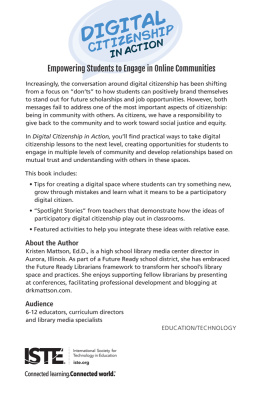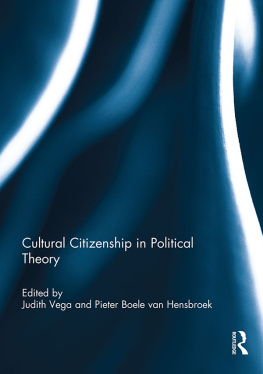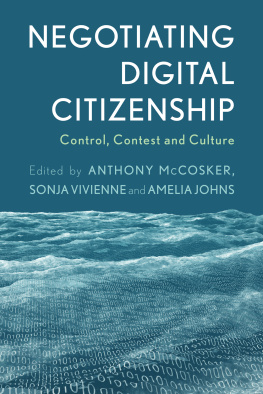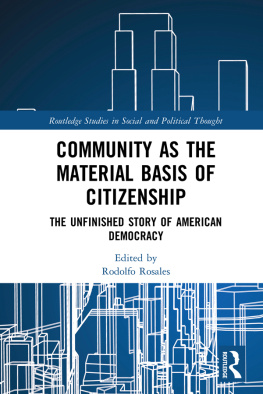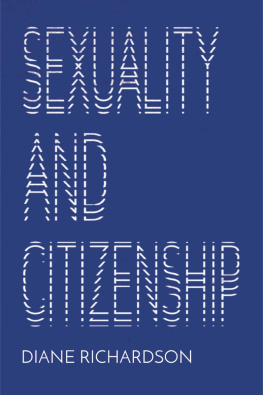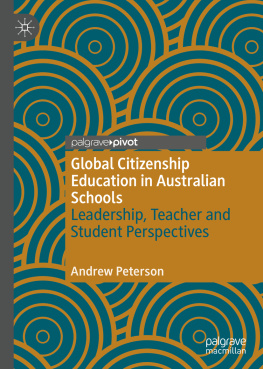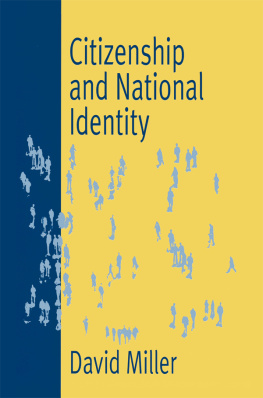Contents
Guide
Pages


Digital Citizenship in Action
Empowering Students to Engage in Online Communities
Kristen Mattson
2017 International Society for Technology in Education
World rights reserved. No part of this book may be reproduced or transmitted in any form or by any meanselectronic, mechanical, photocopying, recording, or by any information storage or retrieval systemwithout prior written permission from the publisher. Contact Permissions Editor: iste.org/about/permissions-and-reprints; permissions@iste.org; fax: 1.541.302.3780.
Acquisitions Editor: Valerie Witte
Copy Editor: Kristin Ferraioli
Proofreader: Linda Laflamme
Indexer: Wendy Allex
Book Design and Production: Jeff Puda
Cover Design: Eddie Ouellette
Library of Congress Cataloging-in-Publication Data available
First Edition
ISBN: 978-1-56484-644-0
Ebook version available
Printed in the United States of America
ISTE is a registered trademark of the International Society for Technology in Education.
About ISTE
The International Society for Technology in Education (ISTE) is the premier nonprofit organization serving educators and education leaders committed to empowering connected learners in a connected world. ISTE serves more than 100,000 education stakeholders throughout the world.
ISTEs innovative offerings include the ISTE Conference & Expo, one of the biggest, most comprehensive ed tech events in the worldas well as the widely adopted ISTE Standards for learning, teaching and leading in the digital age and a robust suite of professional learning resources, including webinars, online courses, consulting services for schools and districts, books, and peer-reviewed journals and publications. Visit iste.org to learn more.
Join our community of passionate educators
ISTE members get free year-round professional development opportunities and discounts on ISTE resources and conference registration. Membership also connects you to a network of educators who can instantly help with advice and best practices.
Join or renew your ISTE membership today!
Visit iste.org/membership or call 800.336.5191.
Related ISTE Titles
Digital Citizenship in Schools, Third Edition, by Mike Ribble
To see all books available from ISTE, please visit iste.org/resources.
About the Author

Dr. Kristen Mattson is a wife, mother of three, former English teacher, and current high school Library Media Center Director in Aurora, Illinois. She partners with teachers in all content areas to integrate digital literacy, research skills, creation, and innovation in the classroom. In addition to supporting teachers, Kristen finds joy in supporting fellow librarians by hosting site visits, facilitating professional development, and blogging about her experiences.
Kristen holds a Bachelors Degree in Education and a Masters Degree in Instructional Design and Technology. She earned her Doctoral Degree in Curriculum and Instruction Leadership from Northern Illinois University in 2016 after conducting a critical discourse analysis on secondary digital citizenship curriculum.
Acknowledgments
I want to thank several individuals who have been instrumental in making this book possible:
My professors, specifically Dr. Joseph Flynn and Dr. Michael Manderino, who saw promise in my work and continued to push my thinking in new and exciting ways.
My #digcit PLN, including (but not limited to!) Nancy Watson and Dr. Marialice Curran, who have always been willing to ideate with me, read drafts of my work, and offer constructive feedback when I needed it.
The team at ISTE, including editor Valerie Witte, who made the process of writing my first book such an enjoyable one.
My husband, children, and parents. Your unwavering support is the reason I am able to continue to do what I love. Thank you for that gift.
My biggest debt of gratitude is to the educators featured throughout the book: Thank you for trusting me to write and share your stories. Thank you for the work you do day in and day out as forward-thinking educators, willing to embrace the messy and unpredictable in order to help students succeed.
Dedication
To Marybeth and Dolores; two strong women in their own right who set the course for generations of strong women to follow.
Thanks for dreaming with me and never doubting that I would grow up to be exactly what I wanted to be.
Foreword
All of us live in two places at once, at every moment, wherever we go. First, we live in real life, or RL, as we now refer to it. Once simply referred to as life, we have had to rename it in order to distinguish it from the second place we now live, which I call IR, or immersive reality. Regardless of what name you use, this second reality consists of the ubiquitous, massively interconnected, parallel universe on the other end of our smart devices that provides integrated functionality for every aspect of our lives. Our devices are, to quote MITs Sherry Turkle, always on and always on us, immersing us in a secondary source of information and a sense of place, wherever we are. Although we could turn this second reality off anytime we like, the reality is that we are never going to. It is here to stay and will become more indispensable as its power evolves.
We also live in a third world: the world of imagination. It is here that we can dream boldly about how to integrate RL and IR, and how to shape the endless possibilities that living a digital lifestyle presents us. And its here that we have let ourselves and our students down in terms of an approach to digital citizenship. The education world has imagined mostly fear. And most importantly, it has imagined our new digital world largely without student voice.
In fact, the most important digital citizenship conversations we can have are with our children. If we are looking for a focus for that conversation, let it be the following question: How can we make the internet a positive influence in the lives of our children? Unfortunately, that conversation rarely occurs and when it does it is often one-sided, with adults handing out lists of donts to students about how to behave online. There are rarely dos to go along with the donts, and students often have no hand in crafting the internet user agreements that define their virtual lives as they are lived at school.
Thats why when I imagine how to approach digital citizenship in schools, in my minds eye I see an end to adults making all the internet rules for students without their participation. Of course, we should be involved. But when we make all the rules, we rob our students of the opportunities they need and deserve to see the bigger picture and to apply their understanding of that bigger picture to themselves and the digital lifestyles that they live. If we dont ask them to help frame the system, they tend to game the system. That is, when we make the rules, its game on for them in terms of figuring out how to circumvent those rules. But when the rules are their rules, their approach shifts. I have worked with thousands of students using an activity I call Youre in Charge in which I ask them to create policies about using technology and the internet in their schools that they will have to live by. In every case, students tend to become much more adult and conservative in their perspective than when they are not involved. They want their online spaces to be safe and respectful and look at activities such as cyberbullying as a kind of virtual vandalism. Why dont we know this? Because we often dont involve them in the discussion.

